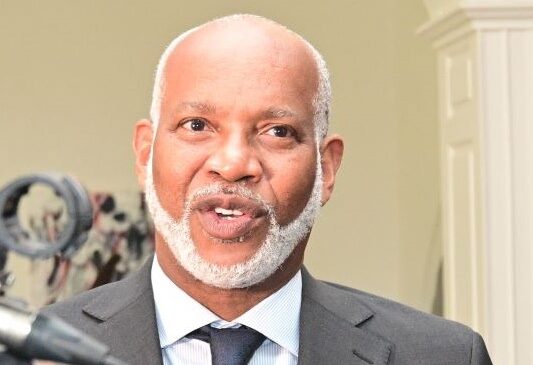
Introduction:
Today, Friday, is the 15th birthday of Google – Happy Birthday. It is hard to imagine that the new technology which drives our lives has only been around since the early 1990s. Almost everything we do, every activity we undertake, is now driven by some form of technology, in a way that was unimaginable all those years ago. It is only when we get in to silly conversations about having learned to type on a typewriter that we realise that not many young people in our offices even know what a typewriter is. When you tell them that, as late as the 1970s, to make an overseas call one had to book the call through the telephone exchange and the operator would call back hours later to put you through to friends and relatives in Barbados, people think you are making it up. Now our lives are dominated by smart phones, which are not just mobile (cell) phones, but are mini computers capable of doing everything that a personal computer can do. Land lines are now the reserve of the massive amounts of data that flow around the globe every second, doubling three years. It is only when you come to a society such as Barbados that you fully realise the hidden dimensions of digital poverty, and what this will mean for the next generation if the government and private enterprise do not make an urgent attempt to drag Barbados kicking and screaming in to the modern age.
Technological Efficiencies:
One of the great disappointments was that as the global and regional banking and economic crises impacted that a radical programme of digitisation did not take place across government. The initial cost may have been prohibitive, but the savings over the next five to ten years would more than have paid for any such spending. New technology would not only make government department with synergies work more efficiently together, but it would have transformed the entirety of government, reducing transaction costs, straight through processing for basic services, and improving the quality of service to the public in ways they have never experienced. I will give only two examples of these synergies and how technology could improve the quality of service: by linking the land registration department with the land tax office, staff and customers would have a service that in many ways would be reduced to seconds, rather than the system we have at present. By allowing staff and customers such facilities as read-only, to make only basic changes such as correct spelling of names and addresses, and with certain managers having appropriate permissions to alter data, would result in a massive improvement. Or, by linking the registry if births, marriages and deaths files with the Archives department (for older certificates) could mean a same day, or even an hourly service, for customers. Why should they have to make a special journey to a department in Black Rock, two miles from the Court buildings, to get hold of a certificate that could be accessed online and printed out within seconds?
Digital Finance:
Retail investments are but one of the many ways for which Barbadians pay a high price for the awful digital poverty the nations is experiencing. An up-to-date digital facility will greatly enhance the quality of service firms offer their customers and the degree of transparency and in so doing get to know their customers and their needs much better. It also speeds up the international payments system. This will improve efficiencies and drive forward economic growth. Two examples demonstrate the point: ten years ago in Denmark, fewer than 40 per cent of Danes used internet banking; today that number is 80 per cent, and most people believe that they now get a better service. Also, in 2009, at the height of the global banking crisis, there were no computer tablets in use in Britain, outside a few university technology departments, today there are ten million users. Another example is the use of executive meetings, most of which are now face-to-face, but by 2015, this is predicted to fall to 20 per cent with 80 per cent of meetings, both within organisations and between offices, taking place on the internet. Most of my meetings are now webinars. In short, the internet allows organisations to return people at the heart of their decision-making. And this is not wishful thinking. In 2012, US$18bn was spent by corporates trying to understand their customers’ needs. Customer insight is what drives a business and the key to this is the mining of big data. In the old days this was done through research surveys, with old men and women standing at street corners with clipboards asking passers-by questions. Technology has made this method redundant. Big data allow financial analysts and other researchers to build a comprehensive model of clients’ lifestyles, through the mining of credit card, mobile phone, debit card and other electronic footprints.
Another source of quality customer information is the use of popular websites – free at the point of use in exchange for tracking of websites visited and downloads. This is what Google does. Dynamic modern enterprises learn quite quickly how to monetise this data, or how to use the advancing technology to modernise old business models. The ethical question is if we are going to anonymise that information, or aggregate it in a collective unidentifiable form. For example, one of the most successful new technology enterprises is Amazon, which, on closer examination is not that radical as a new business model. Amazon has taken the old mail order business model and superimposed new technology on it. No more, no less. Equally, Google has used a number of algorithms to link searches with advertisers, the so-called Google adwords. So, much of the new industries and enterprises are not simply re-inventing the wheel, but adding new knowledge to what we already know.
Strategy:
One new development is the way strategy interfaces with technology. New business models mobilises technology to satisfy customer needs and deliver surpluses – called rents in economics – to the providers. With the use of technology, analysts can identify consumer groups, engage with those groups, deliver value to them and, finally, monetise that service. At the heart of a firm’s strategy is how to engage the customer. A good example of this is an attempt I made a couple years ago on November 5, what used to be called Guy Fawkes’ Day in Barbados, to buy some conkies. I visited every supermarket and bakery on the south coast without any luck; then a feisty middle aged lady told me: “We don’t do conkies now on Guy Fawkes’ Day, you have to come back on Independence Day.” I was left wondering where was the entrepreneurial spirit in Barbados? If there was a market for conkies, then it did not matter if they were offered for sale on Independence Day, Guy Fawkes’ Day, Sundays, Christmas Days or every day of the week. It is the same things with offering a transport solution. If you have a bus or ZR van, then you work certain routes, preferably at certain times, and the onus is on the traveller to make him/herself available to catch the bus. However, if you are offering a taxi service, the onus is on you the provider to attend the passenger at the time and place s/he requests and deliver him/her to his destination. This is the nature of business, you get what you pay for. Equally with airlines: some airports pay airlines to include them in their schedules, others charge the airlines for their landing spots. It is the same with so-called budget airlines: in exchange for the low cost airfare, some passengers are prepared to put up with certain inconveniences, while others are prepared to pay a higher price and get a better service.
Digital Government:
Digital government would not only lead to better government, it would also improve the quality of service, some more so than others. Take VAT tax collection: If the service is digitised, it would mean that as period of grace of no more than one month between making a sale or providing a service, collecting the VAT and handing it over to government. Late payment would lead to a penalty charge, and non-payment to criminal prosecution. The same goes with the police. The use of modern technology would resolve the crisis of having 30,000 uninsured drivers on the roads. They would be tracked and monitored through global positioning satellites, police, road tax offices, motor insurance companies and the police would have access to the same computerised records, providing up-to-date information on vehicles owners and the status of their insurance. More than that, modern technology would allow the government to keep detailed records of every citizen from birth to death and everything in between. You will not have the half-way house of having identity cards, but they are voluntary. Take tourism: every man, woman and child arriving and leaving Barbados must fill in a landing form. What happens to these forms after is not quite clear, but this has been going on since the 1970s, yet it does not appear to inform official decision-making.
According to a study by Cass Business School, there are only 850000 people in the UK with liquid assets of £150000 or more, compared with 4.2m with £30000, so if our tourism strategy is based on an estimate of moderately high net-worth people – the top end of the UK market – then the universe is relatively small. All this is information that we should have had decades ago. At least since the 1970s we should have such a comprehensive profile on UK visitors to Barbados that the British government should be approaching us for copies of our reports. Such failure is not just that of policymakers, it is also a failing of politicians, academic economists and sociologists and the hotel and tourism sector.
How much do our hotel proprietors know about the guests who have been occupying their premises since Ronald Tree declared the tourism industry alive and well? I have stayed in hotels in Barbados, both on the South and West coasts, and have never once received a marketing letter or flyer from them in all that time. And I am sure I am not the only person not to.
The Future is Digital:
One of the mantras of modern business is that the future is digital, that eventually the online experience will conquer bricks and mortar businesses. Although this, like most things, may eventually come to past, the reality is that there is very little evidence, outside the money markets, to suggest this may be true. Morrison’s, the UK’s fourth largest supermarket, is a good example of this trend towards online dominance.
In the summer of 2013, the supermarket invested over £27m developing a platform for online shopping before abandoning it to invest £344m in rival Ocado’s operation. Previously, like most of the other big supermarkets, Morison’s had invested heavily in local convenience stores, rivalling the Asian-dominated corner shops. Quite clearly the decision to invest hundreds of millions of pounds in online shopping was a contradiction of the convenience shop model, or a belief that the two can co-exist with consumers using the online platform for their monthly shop and the convenience shops for emergencies. If that is the case, then the supermarket’s senior executives were in the process of managing the decline of the bigger bricks and mortar supermarkets, since these were the destination of choice for family shopping. Both models cannot be right.
Online Education:
The internet has been a transformative driver for the way education is delivered. No longer is there a need for a teacher at a blackboard with the whole class sitting behind wooden desks facing him or her. Now lessons can be delivered remotely, with each child armed with a tablet and accessing lessons at times part of their convenience and part as arranged by the teachers. What electronic classrooms do is to allow data to be grabbed and stored so that parents and teachers can monitor how their charges are doing. This will introduce enormous advantages to parents and the authorities allowing them to tailor lessons and methods of teaching for each individual child. No longer will the slowest in the class be hidden away behind the cacophony of noise coming from the thirty or so other children. This model is also a challenge to classroom-based higher education. Why should someone desperate to learn pay a university massive amounts of money when cheaper, or even free, version are available on the internet. A number of US universities now offer free online classes, the Khan Academy offers online lessons and a number of UK Russell Group universities will be offering free online courses from November.
Analysis and Conclusion:
There is a crucial difference between the introduction of new technology and the mobilisation of that technology in order to serve traditional business purposes. What is important strategically is to define the customer: is it the end user or the intermediary, the bank or the bank accountholder? Then frame the new model to deliver to that person or institution. One of the risks we run with the internet, and a major one, is that we expose ourselves to all forms of cyber crime, from teenage bullying to identity fraud. But, in many ways, this is the price of progress; we cannot retreat from new developments because they may be abused by the dishonest and criminal-minded. The former editor in chief and chief executive of Barbados Today has told of how he developed the project in his dormitory room in the US. Now it is one of the more successful media organisations in Barbados. This alone shows that with imagination, thinking outside the box to use a tired phrase, can produce wonders. New technology is not just a business and administrative tool, we have seen how Barack Obama and his supporters have used the internet to ambush much better financed presidential rivals. This opens the way for pressure groups, non-governmental organisations, protest groups and other community organisations to seek crowd-funding and to mobilise supporters. That this is yet to take off in Barbados and the wider English-speaking Caribbean is a further manifestation of the underdevelopment of the new technology within the region. Digital poverty is the ultimate disadvantage that any government could inflict on its citizens.
Long after we have forgotten about austerity, the banking crisis and political incompetence, our children and their children will be in the back of the class compared with the Singaporeans, Chinese, Scandinavians, Americans, Indians, French and many others.




The blogmaster invites you to join the discussion.